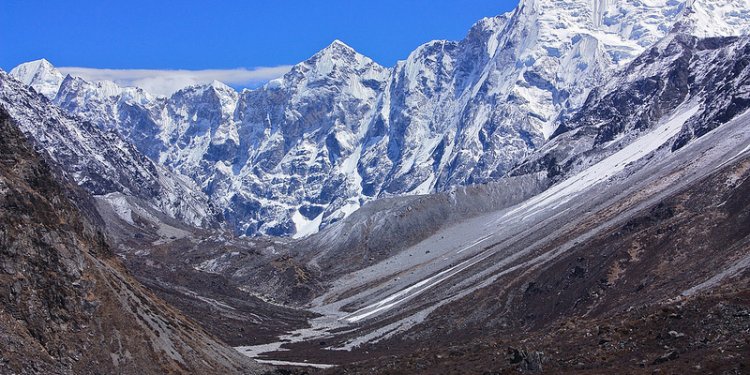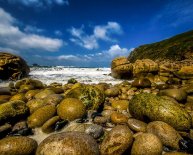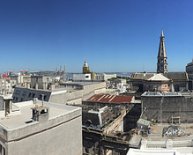
First Sherpa to climb Mount Everest
This week, climbers stood atop Mount Everest for the first time in two years. An avalanche in 2014 and an earthquake the next year made for the two deadliest days on the mountain ever. Many of those who died were members of the Sherpa ethnic group who typically work in the mountain as porters and guides. From Kathmandu, Danielle Preiss reports on how Sherpas are now weighing the risks of the job.
DANIELLE PREISS, BYLINE: Two years ago, Everest guide Namgya Sherpa was on the mountain when an avalanche nearly took his life.
NAMGYA SHERPA: Could not breathe for a few minutes.
PREISS: Sherpa survived, but 16 of his Nepali colleagues were killed. Sherpa, who has summited Everest 11 times, was just a few minutes ahead of them.
SHERPA: There was no chance for us to, you know, escape.
PREISS: A year later, it happened again. This time, the earthquake triggered an avalanche that took at least 18 lives at Everest base camp, 10 of them Sherpa. The twin tragedies jeopardized the millions of tourist dollars Everest brings into cash-strapped Nepal. Each permit alone draws $11, 000, though groups split the cost. This year, 289 climbers are taking their chances, a drop of about 20 percent from 2015.
The first team of Sherpa workers reached the summit Wednesday, ferrying equipment and securing ropes for paying clients who will try for the top during a short window of good weather. A three-man British-Mexican team summited the next day with guides. But the last two years have left members of the tight-knit Sherpa community wondering if the risk is still worth it.
THUPDEN SHERPA: Some Nepalese like the Sherpas, they have canceled their expeditions. Yeah, they have skipped this for one year.
PREISS: Thupden Sherpa manages Arun Treks, where Namgya Sherpa got his start. A Sherpa guide makes up to $5, 000 a season. The average Nepali earns about $700 a year. Namgya Sherpa says his family wants him to quit, but he's got no other job options. He hopes 2016 will give his new company its first summits and maybe let him stop climbing. Ang Tshering Lama quit guiding on Everest in 1999.
ANG LAMA: And their wage and their incidents is not enough, I guess, after all the hard work they put it.
PREISS: He says the scene has changed, with less experienced climbers and crowds compromising safety. And despite intensified calls for reform after the last two years, little has improved. Helicopters are now carrying some gear instead of porters. And compensation given to families after deaths went from $10, 000 to $15, 000, but that's about it.
DOMA KHATRI: Right side, me. And this sister. And little boy, brother.
PREISS: Twenty-one-year-old Doma Khatri is the eldest daughter of the late Dorje Khatri, Namgya Sherpa's cousin, who died in 2014 avalanche. She's showing family photos in the Kathmandu home she shares with her mom and brother. A white scarf covers a framed portrait of their dad.
And this is your father?
KHATRI: Yeah.
(Through interpreter) Yeah. It's too hard to look at his face. So we cover it like this.
PREISS: Dorje Khatri nearly quit climbing three months before he died. He had just survived an avalanche on another mountain and promised his family he was done. But Doma says he was such a sought-after guide he relented to climb Everest once more.
KHATRI: (Through interpreter) His left leg was sticking up like this. The rest of his body was totally covered. They recognized him by his boot.
PREISS: The family used up most of the compensation money they got on his funeral. Private donations paid for their first house. Khatri had secretly purchased the land and planned to surprise them when he returned from Everest. Cooking breakfast here, his widow Phuputhakche says life in the city is a lot easier than the mountain village where they lived before he began earning on Everest. And the industry is still what's keeping the family above water. Doma Khatri took over for her father as head of household and is now an accountant at the agency where he used to work.
KHATRI: (Through interpreter) We need to run this business, so I won't say don't come.
PREISS: For many Sherpa families, Everest continues to be both a liability and a lifeline. For NPR News, I'm Danielle Preiss in Kathmandu.
Copyright © 2016 NPR. All rights reserved. Visit our website terms of use and permissions pages at for further information.
NPR transcripts are created on a rush deadline by Verb8tm, Inc., an NPR contractor, and produced using a proprietary transcription process developed with NPR. This text may not be in its final form and may be updated or revised in the future. Accuracy and availability may vary. The authoritative record of NPR’s programming is the audio record.

















